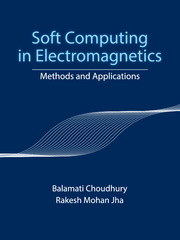Book contents
- Frontmatter
- Dedication
- Contents
- List of Figures
- List of Tables
- Preface
- Acknowledgments
- Abbreviations
- Symbols
- 1 Introduction
- 2 Soft Computing Techniques
- 3 Soft Computing in Electromagnetics: A Review
- 4 Bacterial Foraging Optimization For Metamaterial Antennas
- 5 PSO for Radar Absorbers
- 6 Characterization of Planar Transmission Lines Using ANN
- 7 Fault Detection in Antenna Arrays
- 8 Multi-Objective Particle Swarm Optimization for Active Terahertz Devices
- 9 Soft Computing based CAD Packages for EM Applications
- Author Index
- Subject Index
Preface
Published online by Cambridge University Press: 05 July 2016
- Frontmatter
- Dedication
- Contents
- List of Figures
- List of Tables
- Preface
- Acknowledgments
- Abbreviations
- Symbols
- 1 Introduction
- 2 Soft Computing Techniques
- 3 Soft Computing in Electromagnetics: A Review
- 4 Bacterial Foraging Optimization For Metamaterial Antennas
- 5 PSO for Radar Absorbers
- 6 Characterization of Planar Transmission Lines Using ANN
- 7 Fault Detection in Antenna Arrays
- 8 Multi-Objective Particle Swarm Optimization for Active Terahertz Devices
- 9 Soft Computing based CAD Packages for EM Applications
- Author Index
- Subject Index
Summary
At this point, we are at the throes of two revolutions — one is the information revolution and the other less visible one…. is the intelligent systems revolution.
—Lofti ZadehEver since the days of Aristotle, classical scientific thinking has been based on strict logic, well-constructed definitions and mathematical expressions. This approach to science changed drastically when Dr Lofti Zadeh published his famous paper ‘Fuzzy sets. Information and Control’ in 1965. By introducing imprecision in science, Dr Zadeh created in-roads into developing greater understanding in the field of artificial intelligence and even certain areas of philosophy and psychology! This imprecision, he claims, had led to a revolution in intelligent systems that has affected the way we live.
Today, the idea conceived by Dr Zadeh has grown into a whole new field of science—the field of soft-computing. Algorithms that attempt to mimic animal and human behaviour, evolution, etc., have been developed and implemented in problems ranging from scientific ones to even problems in economics and humanities! Certain researchers have also noted that soft computing techniques offer an alternate methodology to solve mathematically intensive problems.
The extension of this wondrous computation technique into one of sciences most mathematically challenging field, that of electromagnetics, is not surprising. This book address the implementation of soft computing in numerous, common electromagnetic problems. In doing so, computationally intensive, time consuming, three-dimensional electromagnetic simulations may be replaced by these fast-converging algorithms, thereby simplifying the process of electromagnetic design. This realization has led to a concerted effort by the Center for Electromagnetics, CEM (to which the authors are affiliated) towards improving existing research in soft computing. This book is a culmination of these efforts.
Accurate, reliable and fast optimization techniques are a priori requirements to cater to the demand for high performance, real time electromagnetic design objectives. Soft computing techniques are emerging as important tools in design and optimization of various complex electromagnetic problems. In view of this, an attempt has been made in this book to cover soft-computing based solutions to such EM problems. A brief overview of the topics covered in the book is given below.
Resolving problems such as fault detection and compensation in active antenna arrays are important for the aerospace community; finding out real time, cost effective solutions to these problems will help in handling critical situations.
Information
- Type
- Chapter
- Information
- Soft Computing in ElectromagneticsMethods and Applications, pp. xix - xxPublisher: Cambridge University PressPrint publication year: 2016
